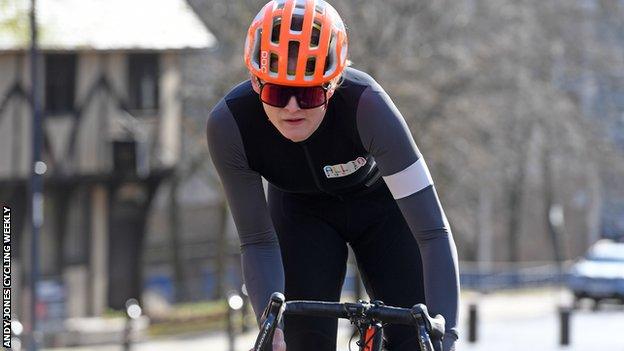Emily Bridges: Transgender cyclist still seeks clarity on 'alleged ineligibility'
- Published

Emily Bridges previously set a national junior men's record over 25 miles and was selected to join British Cycling's senior academy in 2019
Transgender cyclist Emily Bridges says she has been "harassed and demonised" after being told she cannot compete in the National Omnium Championships.
Bridges, 21, says she has provided medical evidence that she is eligible to race in her first women's event.
However, she still has "little clarity" around her "alleged ineligibility".
"No-one should have to choose between being who they are and participating in the sport that they love," she said in a statement on social media., external
Bridges says that, for the last six months, she has been in contact with British Cycling and the sport's world governing body, the Union Cycliste Internationale (UCI), over the eligibility criteria she needed to meet to compete this Saturday.
British Cycling's transgender regulations, which were updated in January this year, require riders to have had testosterone levels below five nanomoles per litre for a 12-month period prior to competition.
Bridges says she has provided both British Cycling and the UCI with evidence that she meets the criteria "including that my testosterone level has been far below the limit prescribed by the regulations for the last 12 months".
The UCI told British Cycling that, because international ranking points are allocated at national championship events, Bridges' participation could only be allowed once her eligibility to race in international competitions is confirmed. That process is currently ongoing.
British Cycling said on Wednesday they had been informed by the UCI that "under their current guidelines Emily is not eligible to participate" in this weekend's event in Derby.
But Bridges said: "Despite the public announcement I still have little clarity around their finding of my ineligibility.
"I am an athlete and I just want to race competitively again. I hope that they will reconsider their decision in line with the regulations."
She added: "I've been relentlessly harassed and demonised by those who have a specific agenda to push.
"They attack anything that isn't the norm. This is without care for the wellbeing of individuals or marginalised groups."
Bridges says her privacy has also been "totally violated" and she has received "targeted abuse" on social media, "despite the fact I have not yet raced in the female category".
Bridges began hormone therapy last year as part of her gender dysphoria treatment and continued to compete in men's races, but she was a provisional entry on the women's starting list for the National Omnium Championships.
According to Cycling Weekly,, external Bridges has been participating in a study at Loughborough University to track her own power data with reduced testosterone levels - and says they show a 13-16% drop in her power outputs across six-second, one-minute, five-minute and 20-minute durations.
Bridges also says she has received a mixed response on speaking publicly about her transition, but many female cyclists have sent messages of support.
However, after the UCI deemed she is ineligible, British 800m athlete Ellie Baker said on social media:, external "I would refuse to race and hope that the other women would stand with me on this too.
"This is totally unfair. The advantages a trans women has had from going through puberty as a boy to a man can never been undone."
On Thursday, Liz Ward, director of programmes at campaign group Stonewall, said Bridges "hasn't been given a fair chance to compete in Saturday's race".
"It is disappointing that UCI have overruled British Cycling's competition criteria, which Emily was in full compliance of," she added.
"British Cycling had already extensively consulted on their trans-inclusion policy, which is fully in line with International Olympic Committee guidelines. Our thoughts are with Emily."